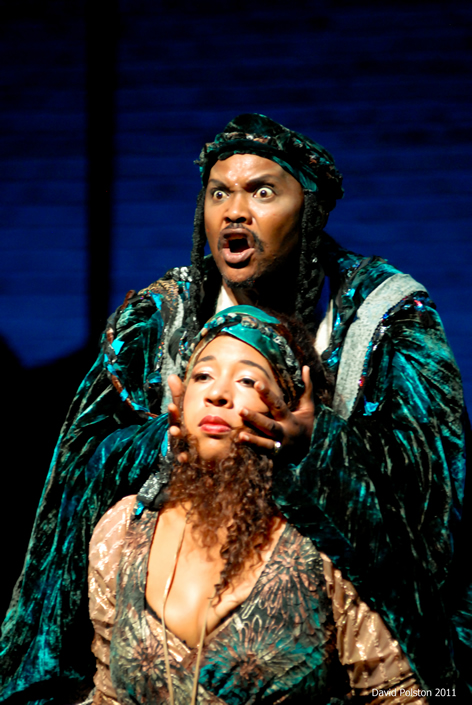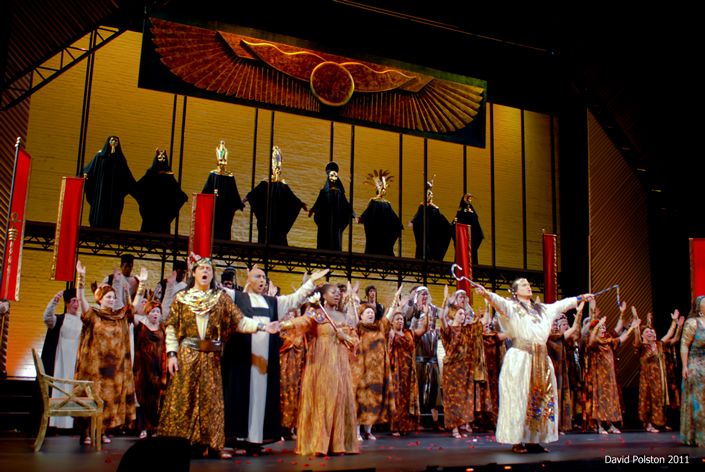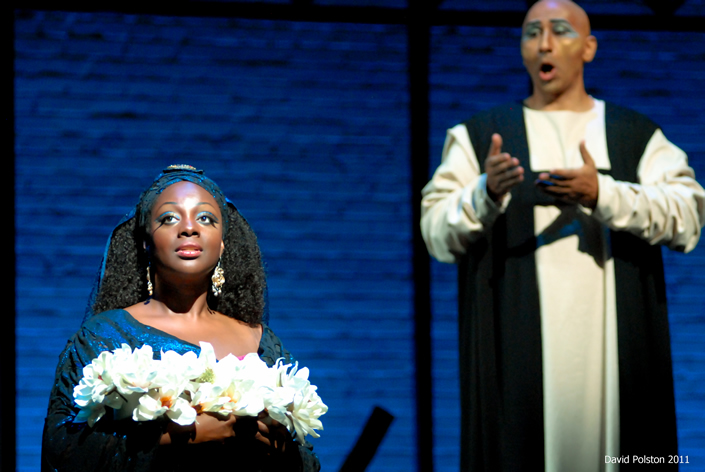Verdi’s Aida and the Need for
A Treaty of Westphalia
By Gabriela Ramírez-Carr
November 2011
Aida (Melodramma) in four acts
First performance 24 December 1871, Opera House, Cairo
By Giuseppe Verdi (1813-1901)
Libretto by Antonio Ghislanzoni (1824-1893)
Virginia Opera at George Mason University
October 2011, Fairfax County , Virginia
Conductor: John DeMain
 David Polston
Baritone Fikile Mvinjelwa as Amonasro and soprano Mary Elizabeth Williams as Aida
|
In late October 2011, the Virginia Opera staged an excellent production of Guiseppe Verdi’s Aida, under the fine baton of conductor John DeMain and the direction of Ms. Lillian Groag. With an international cast from as far away as Cape Town, South Africa, Buenos Aires, Argentina, Cairo, Egypt, and from cities across America, and with participation from the Richmond Ballet, the Virginia Symphony Orchestra and chorus, this performance at George Mason University was indeed memorable.
Aida was crafted by the great Italian composer and statesman, Giuseppe Verdi (1813-1901) in the midst of wars and stormy political developments in Europe, just a decade after his own nation of Italy had achieved its independence as a nation. Aida, as a classical tragedy, examines the flaws in an otherwise potentially successful society, and the tragic consequences of not overcoming them, in politics, war and on the personal level. In this opera, Egypt and Ethiopia are locked in war, with armies led by the Egyptian Radames and the Ethiopian king Amonasro. Unbeknownst to the Egyptians, Aida, the Ethiopian slave to the princess Amneris, is actually the daughter of Ethiopia’s ruler. Both princesses are in love with Radames, and the passions that unfold in these conflicts of love and war can only lead to a better outcome, if the leaders and the society change from their predictable course. The principle characters individually show many noble qualities, yet they and their nations all sink deeper into Verdi's tragedy as the opera progresses. The more joyous their love, the more they suffer; the greater the victory on the battlefield, the more endless the war becomes; and the more the country unites in celebration, the more divisive becomes the heavy-handed theocracy. Verdi gives us a glimpse through this work of the consequences of a lack of vision for a new direction out of this perpetual war.
The Opera in Context
Giuseppe Verdi was not just a scholar and creative composer, he was also a proud patriot and a Senator, engaged for most of his adult life in a battle to unify Italy and to throw out its foreign oppressors. Italy became a unified nation in 1860, but in 1870, political and religious conflicts continued in Europe, and Italy still languished with economic stagnation. Verdi was attracted to the economic efforts of other nations such as the United States building the Transcontinental Railroad (completed in May, 1869) and especially the construction of the Suez Canal (opened in November, 1869) built in Egypt. At the opening of the Suez Canal, Verdi’s Rigoletto was performed. Verdi wrote Aida to celebrate this nation building impulse, but its premier was postponed for a year due to the wars in Europe, which made transportation of costumes and even the libretto, impossible.
In 1868 much of Europe also witnessed a new-found interest in world history as the German businessman and amateur archaeologist, Heinrich Schliemann (1822-1890) used Homer's Iliad to prove the existence of ancient Troy and later to locate Mycenae . (Before Schliemann, archaeologists from the British Museum denied the existence of Troy, and scoffed at the Iliad, insisting that it was pure fiction.)
Verdi insisted that every detail be accurate and so again delayed the premiere one full season so that the opera would be, "composed and executed in a strictly Egyptian Style." He worked with French Egyptologist, Auguste Mariette (1821-1881), studied ancient Egyptian architecture, religion, music, history, rituals, celebrations, and tried to reproduce ancient musical instruments, like flutes and trumpets. Verdi even studied the ancient Egyptian use of flowers and understood the symbolic importance of each species in various ceremonies. Even with today's economic constraints on most opera companies, each production should still be held-up to Verdi's demanding standards.
The Treaty of Westphalia
Verdi here hints at a "Treaty of Westphalia" [1] style solution to this downward spiral of war and vengeance, such as in Act II, when the victorious Radames calls for freeing his prisoners, and is met with wide support from his fellow Egyptians. The Pharaoh announces his support to this act of mercy, saying that it would be a virtuous deed. However, the High Priest objects and prevents the Pharaoh from fully fulfilling his promise.
 David Polston
Tenor Gustavo Lopez Manzitti as Radames, bass-baritone Ashraf Sewailam as Ramphis, mezzo-soprano Jeniece Golbourne as Amneris, bass Nathan Stark as King of Egypt
|
Just as in international policy making today, the High Priest wants to push this “Treaty of Westphalia” alternative off the radar screen. With no plan to win the peace or uplift the population, countries are repeatedly ravaged and humiliated, heroes dishonored, love is unrealized, and vengeance rules the day, both in international affairs and in personal relations. Priests here do not call for restraint, but rather try to whip the crowd into a frenzy chanting, “War!, War!, War!...,” demanding the death penalty on all foreign prisoners and domestic criminals. The metaphor of a population crushed by the weight of an evil theocracy is realized on stage in the final death scene of Radames and Aida, where the massive, heavy stone is lowered over them, thus sealing their fate inside the Temple of Isis. Worst of all, this destruction of lives and nations has been going on for generations, and it looks like it will continue for generations to come—unless changes are made. The Priest is the judge, jury, prosecutor, and acting Prime Minister—and to disagree with him is to disagree with the gods. The Pharaoh is supposed to be the direct descendant of the gods, but it is the High Priest who not only sanctifies this belief, but then also controls the Pharaoh by interpreting for him what those gods demand, deciding when war will be declared and who will lead the battle. The toleration of this social control and rejection of a Westphalian solution becomes the only real threat to their nation—rather than “foreign invaders.” I must add here that although the high priest is one of the most evil characters to ever appear on an operatic stage, he made an effort to give his enemies fair trials—unlike today's world of secret committees writing secret lists of targets for deadly drone attacks!
Ethiopia is presented as a proud, courageous nation with a long history, and is here fighting for dignity and respect. The King's daughter has been captured and is treated as a slave in the royal palace of their enemy. For Ethiopia, this cannot be tolerated. One of the most powerful moments in the opera is when Amonasro, the King of Ethiopia, first appears on stage. He has just been defeated in battle, narrowly escaping death, being held prisoner, and now is being told that he will be executed. He responds by saying that if loving one's country is a crime, then they are all guilty and are prepared to die. He asked that his troops be spared, but does not beg for his own life. It must always be clear in any production of this opera that one of the most noble acts of Radames is to call for releasing his prisoners, and this must never be muddled with some idea that Amonasro is begging for leniency.
Is Amonasro trying to manipulate his daughter, Aida, when in Act III he wants to learn of enemy troop movements? He warns his daughter that she will be cursed by the ghost of her dead mother if she refused to act when her country so desperately needs her help. Or, is his true appeal (and what Aida responds to in the end) not only the image of her dead mother, but a question of her personal identity? No, this is not a manipulative relationship, but rather an uplifting one. Will she be a slave to her own passions, or will she take true leadership like her father, the patriot, willing to sacrifice his personal desires and even his life for his country? Aida announces that she has new-found self-determination and will act on behalf of her nation.
Virginia Opera's Production
Verdi reduced the number of solo arias and increased the number of duets and trios to accelerate the tension among the principals—and the interaction could not have been better. At one point there are 15 different voices singing individual lines simultaneously! Despite all the diversity and activity, from the pit to the stage, and from the singing to the dancing, the Virginia Opera was able to integrate everything perfectly together. Many in the audience around me were literally on the edge of their seats and gasping which each turn of the plot. This production had a way of engaging everyone!
Performing the title role was the youthful soprano from Philadelphia , Mary Elizabeth Williams, whose beautiful elevated voice and impeccable placement for her many long floating notes gave her the confidence for her very convincing stage presence. Her aria, “O patria mia,” was literally a show stopper as the audience felt so compelled to applaud. The mezzo-soprano, Jeniece Golbourne from Rochester, NY, playing Amneris, revealed an enormous vocal range. No note was too high or too low for her precise enunciation—especially her rolling of the “r”—which became a real art form. Ms. Golbourne also has world class acting skills in a roll that requires drastic turns from the sweet and sympathetic, to enraged and vengeful in a snap of the fingers.
Gustavo Lopez Manzitti, tenor from Argentina, played Radames, and has a truly excellent voice. His opening aria, “Celeste Aida” is considered by many to be difficult, especially since it comes so early in the opera, giving so little time to warm-up. A lesser singer might come-in too hard, but our Radames had the experience to have a deliberate placement of each note in order to develop the full texture and richness of the piece—and he was just getting started! About a year ago I saw Fikile Mvinjelwa, baritone from South Africa , in the title role of Virginia Opera's Rigoletto, and my immediate response was that I hoped to see him again soon. Mr. Mvinjelwa has returned to the Virginia Opera stage as Amonasro, which may be a smaller role but equally as critical to the story. He has a deep rich and almost playful voice and seems free to do anything with it without even the slightest forcing.
The bass, Nathan Stark as the King of Egypt has become one of my favorite performers at the Virginia Opera over the recent years. He did a spectacular job as the Commendatore in Don Giovanni and as Sparafucile in Rigoletto. Mr. Stark has a booming rich bass voice and is consistently called on for roles that demand great stage presence, which he fulfills so naturally.
 David Polston
Mezzo-soprano Jeniece Golbourne as Amneris and bass-baritone Ashraf Sewailam as Ramphis
|
Perhaps the most enjoyable to watch of all was bass-baritone, Ashraf Sewailam as Ramphis, who said in a recent interview that he maybe the first Egyptian-born singer to ever perform in a production of Aida on an American stage. He was working as a young architect when he saw a production of Aida at the pyramids of Giza in Egypt , and decided that he wanted opera to be part of his life. He has very round notes and developed a laser like focus to his voice with great projection. After the opera ended and all the singers came out on stage to take a bow, Mr. Sewailam was beaming with great joy, and perhaps a bit of well deserved national pride.
Bravo to all of you!
In less capable hands the ballet part of the opera could become a distraction and a detriment to the storyline. However, the Virginia Opera production was able, especially in the beginning, to use the dancers to add to the spirit of national victory and celebration. The director, Lillian Groag, aided Verdi's search in how cultures fail to see their own stumbling blocks—and in this case the theocracy did not fare well. In the trial scene, for example, Ms. Groag pulls out all the stops as the regal and majestic Amneris has a near volcanic reaction of rage against the priests, so obsessed with blood, for condemning Radames to death. Ms. Groag's only request of her audience is that they come out thinking. With a 26 minute triumphal march, brass instruments, parades, and lots of great singing, Verdi gives us an unforgettable celebration of the nation state (even with its imperfections) and this opera was one of his frequent and pointed assaults against any form of tyranny. What a delightful, provocative production of a delightful, and very provocative opera!
“[The character, Aida] was my best friend operatically and was a natural for me....I always felt, while performing Aida, that I was expressing all of myself, as an American, as a woman, and as a human being....Aida has given me great inspiration on stage and off. Her deep devotion and love for her country and for her people—her nobility, strength, and courage—are all qualities I aspire to as a human being. I will never forget her.”
--Leontyne Price
[1.] The Treaty of Westphalia, signed in 1648, ended 130 years of religious war across Europe . Its building blocks for peace were a respect for national sovereignty, religious tolerance, and economic cooperation. The participating countries agreed that each country had a right to exist and they all had equal legal standing on the world stage. Perhaps most important of all, each country agreed that the best way to guarantee peace was that each nation had to act in the interest of their neighboring countries.
